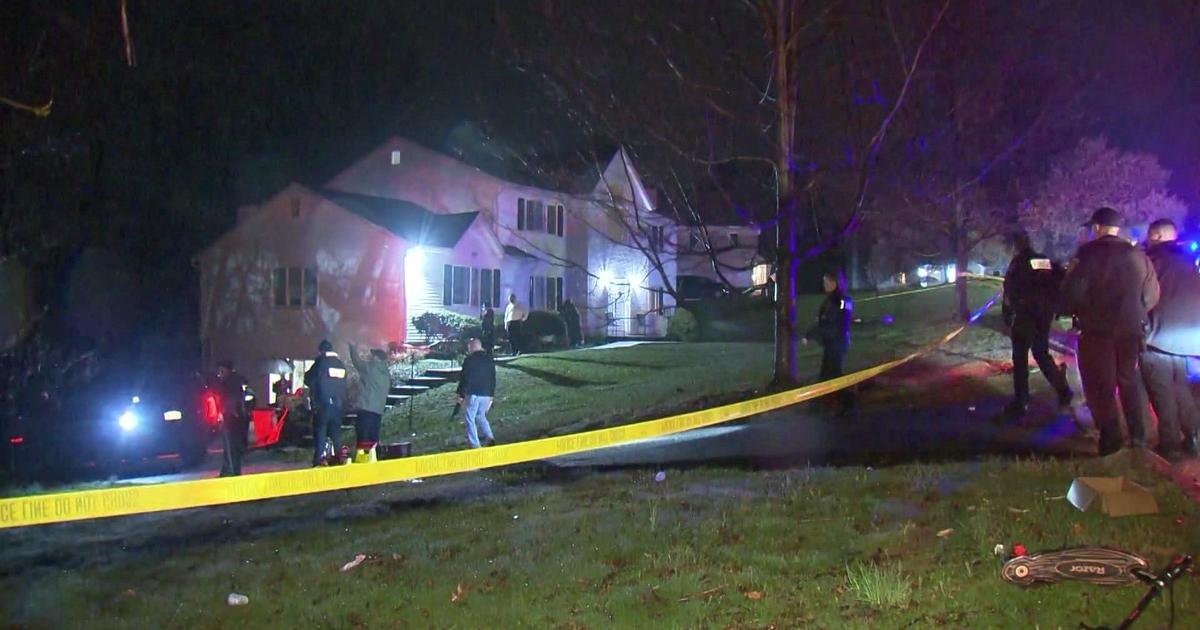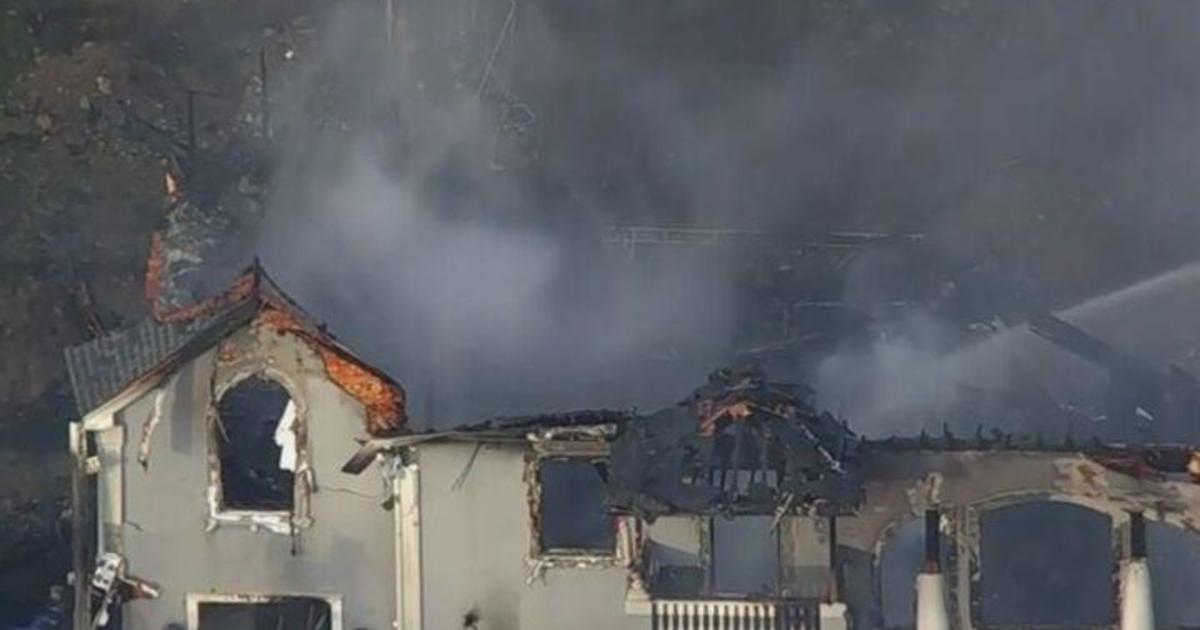Secretary To Gov. Cuomo, Melissa DeRosa, In Hot Seat Amid More Revelations About COVID Nursing Home Deaths
NEW YORK (CBSNewYork) -- Some New York lawmakers are calling for Gov. Andrew Cuomo to be stripped of the emergency powers he was granted to handle New York's coronavirus pandemic.
The fallout comes amid more revelations the Cuomo administration initially undercounted nursing home deaths, CBS2's Andrea Grymes reports.
Secretary to the governor Melissa DeRosa usually sits next to the governor at press conferences, but she now finds herself in the hot seat.
She's under fire for comments she made to a virtual meeting with state Democratic lawmakers about information they requested on nursing home deaths during the pandemic.
CORONAVIRUS PANDEMIC
- Ask CBS2's Dr. Max Your Vaccine Questions
- COVID Vaccine FAQ From CDC
- Vaccination Sites In New York City | Call 877-VAX-4NYC
- Find A New York City Testing Site Near You
- Check NYC Testing Wait Times
- Explanation Of N.Y.'s Yellow, Orange, Red Zones (.pdf)
- Resources: Help With Unemployment, Hunger, Mental Health & More
- Remote Learning Tools For Students And Parents At Home
- Complete Coronavirus Coverage
Queens assemblyman Democrat Ron Kim was on the call. His uncle also died in a nursing home.
"You can't hide information because you think you could be politically hurt in the process," Kim said.
Friday, the governor's office released a meeting transcript.
In it, DeRosa explains the delay in giving state lawmakers information, saying around the time the legislature requested it in August, "President Trump turns this into a giant political football... He directs the Department of Justice to do an investigation into us... Basically, we froze because then we were in a position where we weren't sure if what we were going to give to the [DOJ] or what we give to you guys... Was going to be used against us..."
She goes on to say auditing the exact number of nursing home deaths, between those who died in homes and those who died off-site, was a "massive undertaking" during the height of the pandemic.
Watch Andrea Grymes' report --
Lawmakers on both sides of the aisle were quick to criticize but Republicans especially.
"We need to get people subpoenaed. We need to get them under oath and find out who knew what when," Republican Assemblyman William Barclay said.
They, along with other critics and families, have long accused the Cuomo administration of purposely covering up the exact death toll in nursing homes to hide how state policies may have affected it.
"They played football with my mom and the dads and the grandparents, all to protect their power," said Vivian Zayas, whose mom died of COVID-19.
One Long Island nurse spoke to CBS2's Ali Bauman on the condition of anonymity.
"We had more deaths I saw in my life, more CPR I ever did," she said.
MORE -- REPORT: Early In Pandemic, Over 9,000 COVID-19 Patients Sent Into New York Nursing Homes
She says the Suffolk County nursing home where she worked last spring initially barred visitors in early March amid the pandemic, but then had to admit its first patient coming from the hospital at the governor's directive.
"I put her in a private room ... I explained to her ... you have to stay here for a few days, it's the rules," the nurse said. "And she wanted a cigarette ... I said, 'You're not going out to have a cigarette' ... The next day, I come walking in, and you know, the cigarette smokers were still going out ... and there she is in the middle of them. Well, then it ran through the place rapid."
Friday, after the firestorm of criticism, DeRosa tried to clarify her remarks, saying in part, "We could not fulfill [the legislature's] request as quickly as anyone would have liked."
"They don't wanna own nothing," the nurse said.
In addition to all of this, a bipartisan group of 14 state senators called on the chamber to repeal the governor's expanded emergency powers, which were granted last March. This let Cuomo make unilateral decisions during the pandemic.
The group says it's now time for the legislature to go back to governing as a co-equal branch of government.
Cuomo's office has released the following statement, chronology and transcript:
From Melissa DeRosa: "I was explaining that when we received the DOJ inquiry, we needed to temporarily set aside the Legislature's request to deal with the federal request first. We informed the houses of this at the time. We were comprehensive and transparent in our responses to the DOJ, and then had to immediately focus our resources on the second wave and vaccine rollout. As I said on a call with legislators, we could not fulfill their request as quickly as anyone would have liked. But we are committed to being better partners going forward as we share the same goal of keeping New Yorkers as healthy as possible during the pandemic."
Additional information: It is important to note that the information DOJ requested was different from the information that the State legislature requested.
CHRONOLOGY:
August 3 - NYS DOH Commisioner Dr. Howard Zucker testifies before the NYS Legislature regarding COVID and nursing homes/long term care facilities
August 20 - Assembly and Senate each send letters to DOH with follow up questions seeking additional information
August 26 - DOJ sends letter request to Democratic governors about nursing home fatalities
September - Governor's Office asks legislative leaders to pause our response time to the August 20 letters so the administration can first resolve the DOJ inquiry
October 28 - DOJ sends additional letter inquiry re nursing homes
Thanksgiving/early December - second COVID wave in NYS begins
December 11 - Pfizer vaccine approved
December 14 - first vaccine delivery to NYS
@NickReisman 21m
A statement from Assembly Speaker Carl Heastie's spokesman confirms Cuomo's office asked for more time last year in compiling nursing home data after the August request
this gives some confirmation to a timeline the gov's office laid out this morning: The administration in September, they say, asked for a pause in the request for nursing home data so they could respond to a separate DOJ requestTRANSCRIPT
Senator Skoufis: Commissioner, I'm speaking more generally that just that one question. The Senate letter that we sent had, I think 17 questions. I think there was an Assembly letter with as many questions. So, yes, there is a question of what the data and the audit and you're not going to convince me that you could not have done this audit faster than 6 months time. I believe you started the audit a few weeks ago when this all started to bubble over.
I'm speaking more generally than just the nursing home death numbers.
Melissa DeRosa: Senator, I can take this question. I don't know that this is going to satisfy you, but it's the truth and the truth works almost every time. The letter comes in at the end of August and right around the same time, President Trump turns this into a giant political football. He starts tweeting that we killed everyone in nursing homes, he starts going after Murphy, starts going after Newsome, starts going after Gretchen Whitmer.
He directs the Department of Justice to do an investigation into us. He finds one person at DOJ who since has been fired because this person is now known to be a political hack who sends letters out to all of these different governors. Basically, we froze because then we were in a position where we weren't sure if what we were going to give to the Department of Justice or what we give to you guys and what we start saying was going to be used against us and we weren't sure if there was going to be an investigation.
That played a very large role into this. We went to the leaders and we said to the leaders, can we please pause on getting back to everybody until we get through this period and we know what's what with the DOJ? We since have come through that period. All signs point to they are not looking at this. They dropped it. They never formally opened an investigation. They sent a letter asking a number of questions and then we satisfied those questions and it appears that they're gone. That was how it was happening back in August.
In the intervening period, the second wave happened. The vaccine rollout started and all of our attention shifted elsewhere. I know that's not the answer you want to hear and you guys should be the only priority that we have as we're moving through this -
Senator Skoufis: I'm not so sure that you're ---
Melissa DeRosa: No, no, no - I'm sorry, I didn't mean that to be snarky. I'm saying this sincerely and I've communicated this to Shontell and Louann. I want to make you guys more of a partnership. I want to answer your questions on a rolling basis. I've offered to do something weekly or bi-weekly with you guys to get questions and more often times we can have candid conversations where it doesn't feel like everyone is sniping at each other through the press and it isn't really about the policy and it isn't really about the information, it's about this political back and forth.
That is what happened. On the audit, now that I am knee deep in this and I understand all of this. On April 17, and we don't need to get too far on a tangent, but just so you guys understand part of all this. On April 17, DOH sent out a notification to all of the nursing homes it regulates and says [retro]spectively, tell us anyone that died in the facility, anyone you think died of COVID in the facility - like presumed has a medical context and definition - but just saying presumed in the nursing home [inaudible] I'm going to look backward and guess essentially that you believe was confirmed COVID in a hospital and that you think was presumed in a hospital.
All of a sudden, at the end of April, you get a massive data dump from 600 nursing homes where they're reporting back to January and saying presumed COVID. DOH, in the middle of what was still the height of the pandemic, when we were scrambling on a daily basis to make sure that hospitals weren't overwhelmed and collapsing. When we were trying to make sure that people were getting the care that they needed. We were still making major decisions about what sectors of the economy would be safe to reopen or close, when there was still massive PPE shortages and while we were being shot at on a daily basis from Donald Trump - that we needed to go through these reams of data. 14,000 people. Then it wasn't 14,000, it was like 6,000 or whatever the number was.
None of it was reliable. It was based on initials. It was based on the data that they thought they died in the hospital because they didn't know for sure. It was based on co-morbidities that the list of the co-morbidities are pneumonia, cancer, HIV/AIDS - and they're guessing that because it was around that time, maybe it was COVID. This was a massive undertaking and it was happening while we were still at the height of the pandemic. That's when that data dump happened.
I'm just asking for a little bit of appreciation of the context. Your point is very well taken, Senator, and we are going to do better and you have my promise that we're going to try to do better on a rolling basis to answer you guys if it means Shontell or Louann arrange one-offs and Zooms and phonecalls or weekly meetings, or whatever - I'm open to it.
We do apologize. I do understand the position that you were put in. I know that it is not fair. It was not our intent to put you in that political position with the Republicans.
Senator Skoufis: Okay. Thank you.
Assembly Member Gottfried: We don't have enough time today to explain all the reasons why I don't give that any credit at all.
Senator May: I'd like to jump in here too because and just follow up to James and I, I'm not sure about anyone else in our colleagues here, but also the other thing going on that we were in difficult re-election campaigns and getting hammered about this every single day and apparently my worthwhile opponent who [inaudible] today attacking me on this issue too.
The issue for me, the biggest issue of all, is feeling like I needed to defend or at least not attack an administration that was appearing to be covering something up. In a pandemic when you want the public to trust the public health officials and there is clear feeling that they're not being forthcoming with you, that is really hard. It remains difficult. I think I want to ask you to figure out how do you do this messaging in a way that makes it clear to people - I mean, if you could explain some of these things to people in real time instead of just feeling like you're not telling people the real story that would make it easier on you and easier on us at the same time.
Assembly Member McDonald: Can I just chime in? Secretary, I appreciate your summary of what happened the last few months. So just to summarize and get back on the agenda, just to simplify what's been said, it sounds like there's been multiple data points that had to be matched if that's what I'm hearing. There was a number of extenuating things that were occurring at the same time that prevented the nursing home data to be matched with the hospital data. Whatever. Where are we now? Can we just get to this point? Did we resolve all the data matching? Have we resolved it?
Melissa DeRosa: I'm happy to take this, Assemblyman. Sorry, doctor, if it's okay. I was briefed from the data team right before we came in. So, on page - I actually don't know which page it is - but the upshot is, yes and no. Yes, meaning the confirmed in-hospital we believe is resolved. They're going to go back and audit it again to make sure and they're going to line it up with death certificates once this is all over. That number we believe is firmly resolved. There was the category of probable out of facility. Either in a hospice or a hospital. The nursing home people at DOH went back to the nursing homes and said what did you base this on? Their answer was we based it on what we thought retrospectively.
The latest numbers from the New York State Department of Health show a total of 15,136 nursing home/elder facility deaths related to COVID-19.
Nursing homes:
Confirmed in facility fatalities: 6,249
Presumed in facility fatalities: 2,957
Confirmed out of facility fatalities: 4,170Assisted Living Facilities:
Confirmed in facility fatalities: 128
Presumed in facility fatalities: 24
Confirmed out of facility fatalities: 654Other Adult Care Facilities:
Confirmed in facility fatalities: 40
Presumed in facility fatalities: 30
Confirmed out of facility fatalities: 884
CBS2's Ali Bauman contributed to this report.



